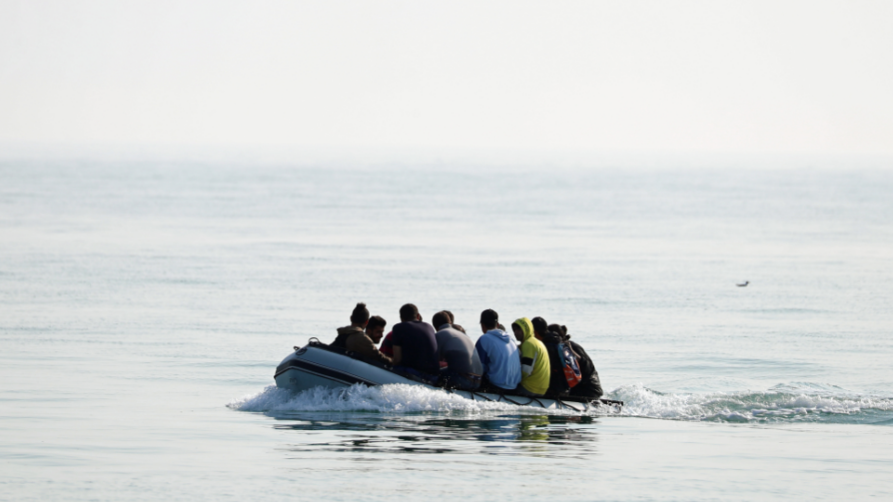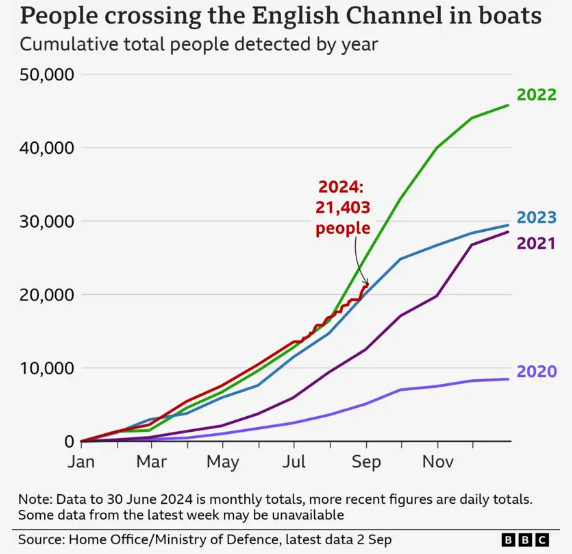UK working with European police to tackle boat gangs

- Published
The UK government is "determined" to go after criminal people-smuggling gangs and is working with European police to prevent small boats crossing the English Channel, Home Secretary Yvette Cooper has said.
"Those gangs should not be able to get away with it," she said after a meeting with ministers, intelligence agencies and law enforcement bodies.
The summit takes place three days after 12 people, including six children and a pregnant woman, died trying to reach the UK from France in the deadliest loss of life in the waterway this year.
Earlier this week, Conservative shadow home secretary James Cleverly said it was "not enough to talk about 'smashing the gangs' when the real-life consequences are so serious".
This year so far, more than 21,000 people have made the crossing, slightly more than at the same time last year but a fifth less than in 2022.
Ms Cooper said the numbers of crossings in July and August were lower than in past years, but said that lives were still being put at risk by gangs operating along the northern French coast.
"The criminal gangs are undermining border security and putting lives at risk," she said.
Having scrapped the previous Conservative government's Rwanda plan, aimed at curbing the number of crossings, Labour will come under pressure to demonstrate that its own approach is working.
The government has said it will focus on stopping smuggling gangs.
Mr Cleverly said Labour should re-establish the Rwanda policy "to stop vulnerable people being exploited and secure our border".
The new Labour government has instead pledged to set up a UK Border Security Command to reduce small boat crossings. The appointment of a commander for the agency is expected in the next few weeks.
Ms Cooper said on Friday that the government had "significantly" increased returns of failed asylum seekers in order to close the asylum backlog and shut costly hotels housing asylum seekers.
The government on Thursday axed a plan to house asylum seekers at RAF Scrampton in Lincolnshire, which Ms Cooper said was expensive and opposed by the local community. She did not provide details when asked on Friday about where asylum seekers would stay instead.
Twelve die after migrant boat sinks in Channel
- Published4 September 2024
France sees Channel migrant deaths as a problem of Britain's making
- Published4 September 2024
Friday's summit was also attended by Prime Minister Keir Starmer, Foreign Secretary David Lammy, Justice Secretary Shabana Mahmood, Attorney General Lord Hermer and representatives from the National Crime Agency (NCA), Border Forces and Crown Prosecution Service.
Graeme Biggar, head of the NCA, was expected to tell the attendees that in recent weeks, co-operation with Bulgaria has led to more than 40 small boats and engines being seized, which could have been used to transport 2,400 people across the Channel.
The NCA says more than 410 small boats and engines have been seized since last spring.
Mr Biggar was also expected to set out the details of 70 other ongoing investigations including raids of warehouses in Libya, where migrants were being held.
The summit will look at analysis of the operational capabilities of the criminal smuggling gangs.
The Home Office had promised a "rapid" recruitment of a border security command chief to target the gangs, however no appointment has yet been announced. Downing Street says it will be confirmed "in the next few weeks".
Ms Cooper said the last two months had seen "encouraging progress, with significant seizures of boats and equipment in Europe".
"But there is work to do," she added, "and the Border Security Command will bring all the relevant bodies together to investigate, arrest and prosecute these networks, as well as deepen our ties with key international partners.
"At the same time, we are swiftly removing those with no right to be in the UK, which will ensure we have a fair, firm and functioning asylum system where the rules are respected and enforced."

The Home Office says a "reset in the relationship with Europe" has led to a 50% increase in the number of NCA officers based with Europol and that officers are being sent to Romania and those South East Asian countries where gangs advertise Channel crossings.
The department argues that this week's deaths in the Channel demonstrate the "increasingly extreme measures the gangs are willing to contemplate as more people are crammed into less seaworthy vessels".
"Intelligence reveals smugglers have also increased the price they charge for migrants to cross the Channel, including charging for children to get into boats, as the business model comes under pressure from UK and partner law enforcement."
Steve Smith, head of Care4Calais, has argued that the "only way to stop the crossings is to create safe routes for people to claim asylum in the UK".
"That's what the new government should be focusing on," the refugee charity head said.
Christa Rottensteiner, the UN's migration agency chief, told the BBC Radio 4's Today programme the provision of more safe and legal routes would take away the demand for smugglers.
"Good international cooperation is also at the heart of it - so tackling smuggling along the whole migration route," she said.
But the former head of the UK border force, Tony Smith, told the programme he hoped the government would reconsider scrapping the Rwanda scheme - the former Conservative government's plan to send some asylum seekers to the east African country - to act as a deterrent to crossing the Channel.
"We have to make it clear to migrants in France who are already in a safe country that actually it won’t work - getting in a small boat, you won't get to stay in the UK and that you’re likely to be relocated elsewhere," he said.

Sign up for our Politics Essential newsletter to read top political analysis, gain insight from across the UK and stay up to speed with the big moments. It’ll be delivered straight to your inbox every weekday.